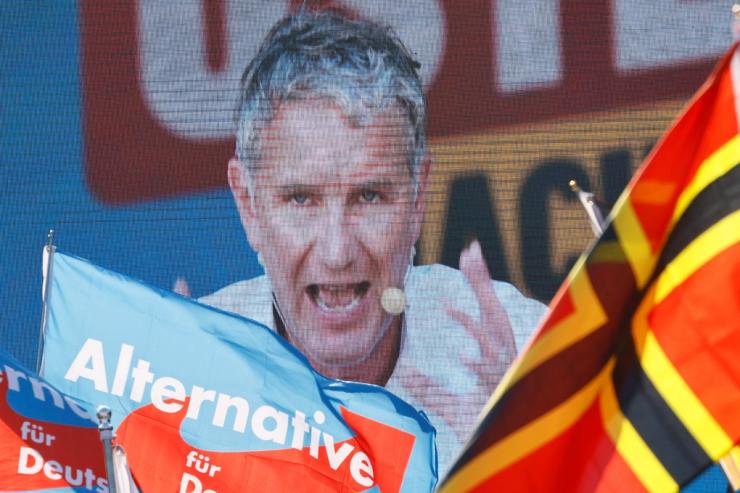The News
Welcome to the Global Hot List, our subjective, dynamic ranking of the races and political developments you should be paying attention to right now, compiled by world elections expert Brad Glasser.
In today’s edition: Germany’s AfD secures first place for the first time in a state election, Modi banks on higher public spending, and Democrats may not bother with Florida this cycle.
The List
1. Germany – State surge
The German nationalist party AfD surged in state elections held in Thuringia and Saxony on Sunday, garnering some of their strongest support with the youngest voting bloc. Taking 32% of the vote in Thuringia, the AfD became the first far-right party to win a state election since the Nazi era. Among Germans aged 18-24, the AfD won an even higher share, with 38% support. The results set up potentially unworkable governing situations given other parties’ refusal to enter a coalition with the AfD. The state of Brandenburg goes to vote later this month, where the AfD will target another first-place finish.
2. Mexico – AMLO push
President Andrés Manuel López Obrador of Mexico has just months remaining in office, but remains adamant about plans for far-reaching institutional changes. AMLO is pushing for what he refers to as “Plan C,” a package of reforms that “would entail sweeping changes to the judiciary, the electoral process, and Mexico’s Congress,” in order to “transform” the country, according to the president. While AMLO describes these reforms as necessary to combat corruption, opponents are accusing him of plotting a “one-party state.”
3. USA – Florida fade
This cycle may see the first time in decades that Democrats don’t make a serious push to win the state of Florida. Even in 2020, a confident Biden campaign made a play to return the state to the Democratic column after Obama’s victories in 2008 and 2012. Elections in Florida have been determined within 10 points since George HW Bush defeated Dukakis with 60% of the vote in 1988. Still, in a highly fluid environment, it’s hard to say what election surprises could be around the corner, even as Democrats seem to be dropping plans to spend in the state.
4. India – Political reversal
India’s Prime Minister Modi has found himself pushed towards higher public spending, as part of a strategy to reverse his flagging political fortunes. Modi’s administration has “stepped up cash handouts, debt waivers and other freebies,” signaling a shift in economic policy with state elections looming that could signal further decline for the BJP. The opposition has put forward their own promises, among them “free power to homes and monthly allowances to women.”
5. Ghana – Third consecutive
If the New Patriotic Party wins this December, it will be the first time in Ghana’s history that a party is elected to a third consecutive term in office. “Frustrations about economic hardship” could define the vote, following a term beset by global crises including the pandemic and the war in Ukraine. But analysts expect a “tight” election, as opposition candidate and former president John Mahama vows a “ruthless war against corruption” in campaigning.
6. UK – Reform shadow
UK politics is now framed by a competition between Nigel Farage’s Reform Party and the Conservatives, each aiming to become the main opposition to Keir Starmer’s Labour. Labour has already seen some of its worst polling in years since Starmer took office, as the prime minister has faced early tests in far-right riots and backlash to government budget cuts. In one poll, Reform stands at 21% of the vote — slightly ahead of the Tories — compared to Labour with 33%. With the next election not required until 2029, however, there’s no telling how circumstances could unfold during this term.
7. Japan – Generational battle
The race for leadership of Japan’s LDP could become a clash between generations, as some voters are seeking a “fresh face.” Scandal within the LDP has “fueled a desire for change,” according to analyst Rintaro Nishimura. “Not just in the sense they need someone new at the top of the ticket, but someone who can really show the public the LDP is changing.” The demise of the LDP’s factional system following revelations of a slush fund has also created “unprecedented uncertainty” regarding this leadership election.
8. Azerbaijan – New majority
An election in authoritarian Azerbaijan will bring about a new majority for its leader, Ilham Aliyev. Aliyev’s New Azerbaijan Party lost two seats in parliament compared to the previous election held in 2020, but Azerbaijan’s parliament will be firmly in the president’s column, as pro-Aliyev parties and independents round out most of the other seats. Azerbaijan, a dictatorship that has drifted towards irredentist nationalism in its conflict with neighboring Armenia, has not seen a “fully free or fair” election in its modern history of independence.
9. Niue – Pacific identity
A referendum held in the small Pacific country of Niue could enhance the sovereignty of the island. Niue, part of the Realm of New Zealand, is home to less than 2,000 people, but the issues here are reflective of a wider dynamic within a community of Pacific islands still pushing against vestiges of colonialism. Niue residents decided on possible changes, including a shift from use of the term “premier” to “prime minister,” a vote that “signifies Niue’s increased focus on their self-governance and the island’s Pacific identity.” The island of New Caledonia, part of France, has recently seen its own intense dispute over sovereignty, leading to talks with separatists.


